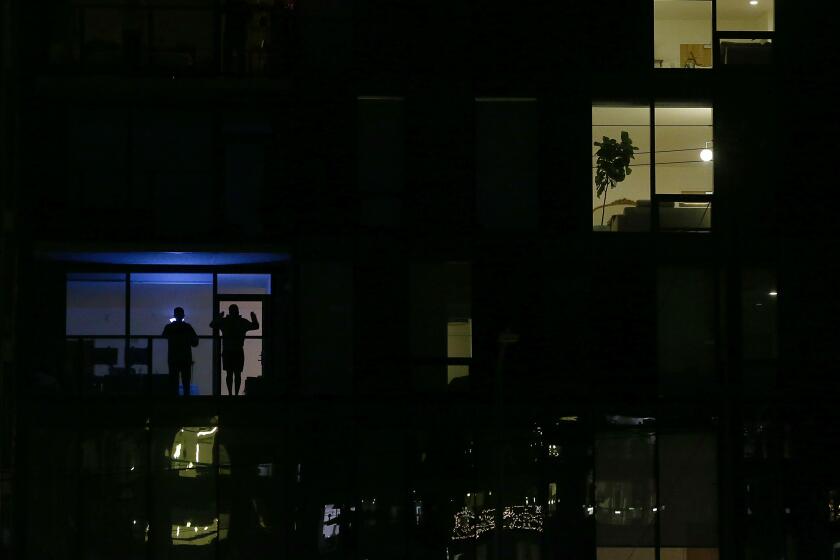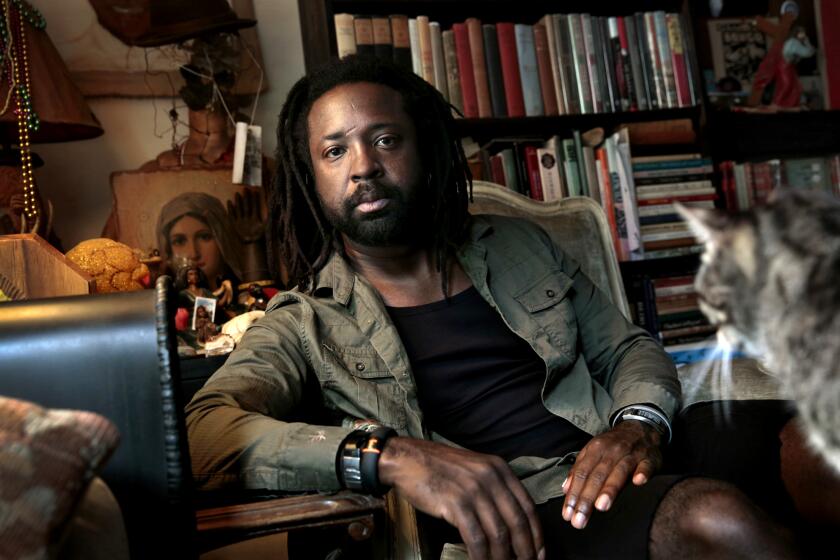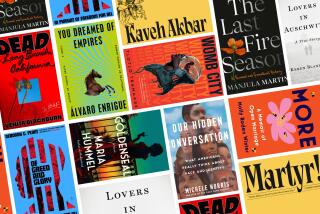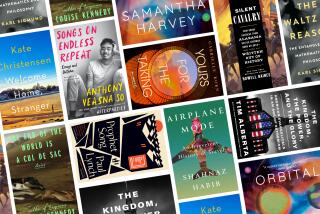Essential end-of-the-world reading list offers a glimpse of the abyss
When the seas of life get rough, some readers look for escape, while others dive right in. So it is during the pandemic, when many book lovers are turning toward apocalyptic fiction.
A modern classic of the genre is Emily St. John Mandel’s “Station Eleven,” which tells the story of a nomadic group of entertainers in the years after a flu has destroyed civilization. “I would not recommend reading ‘Station Eleven’ in the middle of a pandemic,” Mandel told the L.A. Times in an interview.
Yet many people are doing just that: The book is selling briskly just as Mandel’s new novel of financial disaster, “The Glass Hotel,” settles into the Los Angeles Times bestseller list. Mandel joins the L.A. Times Book Club on May 19 for a virtual discussion of these two eerily timely novels.
In advance of Mandel’s appearance, we asked her and a few other authors to help us put together an end-of-world reading list.
“A Canticle for Leibowitz” by Walter M. Miller Jr.
Mandel called the 1961 Hugo Award winner “an interesting and somewhat haunting story. It was the first post-apocalyptic book I read, and reading it made me think for the first time about what a post-apocalyptic world might look like.”
“Fahrenheit 451” by Ray Bradbury
Susan Orlean, author of “The Library Book,” suggested the classic dystopian novel, which played a role in her nonfiction bestseller about the 1986 fire that closed the Los Angeles Central Library for seven years. Orlean also mentioned “A Canticle for Leibowitz.”
Some people look for comfort reads in isolation; David Ulin finds deeper solace in stories of struggle by Faulkner, Jenny Diski and Natalia Ginzburg.
“Fiskadoro” by Denis Johnson
T.C Boyle, author of the upcoming “Talk to Me,” called Fiskadoro “a poetic fever dream which takes place in the Florida Keys a generation after a nuclear war has destroyed most of civilization and rendered vast territories uninhabitable. The novel opens up the reader to what culture is, what it means to its constituency, and how it draws from the traditions of the past in order to create a rationale for the present.”
“The Last Man” by Mary Shelley
Marlon James, winner of the 2020 L.A. Times Ray Bradbury Prize, described the “Frankenstein” author’s later work as “the original speculative novel. Funny enough, it was a plague — I was like, Damn, girl. The original dystopian novel got it right!” He also mentioned “The Handmaid’s Tale,” by Margaret Atwood.
Marlon James, whose novel “Black Leopard, Red Wolf” pioneered queer fantasy, thanks Mary Shelley and “Moby Dick” for predicting our current crisis.
“An Unkindness of Ghosts” by Rivers Solomon
“The vivid, unusual, stirring characters make it a piquant and often enjoyable read despite the pointed bleakness of the setting,” Malka Older, author of “Infomocracy,” said of Solomon’s debut science fiction novel. “It’s structurally and thematically daring and manages to include a little bit of hope while leveling a devastating critique at racism and fascism.”
“The Four-Gated City” by Doris Lessing
“Lessing’s writing is so perfect and full of beautiful details that her apocalypse feels inextricably linked to the rest of her narrative,” said Charlie Jane Anders, author of “The City in the Middle of the Night.” “I feel like people don’t read Lessing as much as they did maybe 20 years ago, and this makes me incredibly sad — of all the 20th century lit authors, she’s the one whose work is the most relevant and timeless in 2020.” Anders also recommended “Cat’s Cradle,” by Kurt Vonnegut, “The Fifth Season,” by N. K. Jemisin and José Saramago’s “Blindness.”
“The Apocalypse Triptych” series
Wil Wheaton, actor and author of “Just a Geek,” suggested this three-book anthology edited by John Joseph Adams and Hugh Howey. The collection “tells stories from three distinct periods in the apocalypse: The end is nigh, the end is now, and the end has come. … While there are fantastic stand-alone stories in each volume, for a reader who wants to take the whole ride, there are some extremely rewarding tales. Standouts include Charlie Jane Anders, Scott Sigler and Seanan McGuire.”
“The Road” by Cormac McCarthy
Aimee Liu, author of the new novel “Glorious Boy,” cited the Pulitzer Prize-winning tale’s “unflinching humanity in the face of horror and uncertainty, all amplified by McCarthy’s refusal to name the precise cause, date, or nature of Earth’s collapse.” Liu also mentioned “The Book of Aron,” by Jim Shepard.
“Station Eleven” by Emily St. John Mandel
“I’m a Shakespeare buff, and I thought it was terribly inventive,” said Jess Walter, author of “Beautiful Ruins” and the upcoming “Cold Millions.” “I admired her deft writing touch and the way she moved back and forth in time.” Walter also mentioned “Oryx and Crake,” by Margaret Atwood, and “Cat’s Cradle,” by Kurt Vonnegut.
Emily St. John Mandel’s last novel, “Station Eleven,” envisioned a pandemic. “The Glass Hotel” plumbs financial doom.
“Blindness” by José Saramago
Alex Espinoza, author of “Cruising, is another fan of Saramago’s story of an epidemic of blindness that sweeps through an unidentified city. “The novel focuses on a group of strangers who are among the first to get infected and are quarantined in a filthy, crowded asylum where they must band together in order to survive. … A terrifying and timely story.”
Wolk has been a senior correspondent for Reuters and NBC News, among other publications.If you go: Book Club
Emily St. John Mandel, author of “Station Eleven” and “The Glass Hotel,” joins the L.A. Times Book Club in conversation with reporter Carolina A. Miranda.
When: 7 p.m. May 19
Where: Free virtual event livestreaming on the Los Angeles Times Facebook Page and YouTube.
More info: latimes.com/bookclub
Sign up for the Los Angeles Times Book Club
More to Read
Sign up for our Book Club newsletter
Get the latest news, events and more from the Los Angeles Times Book Club, and help us get L.A. reading and talking.
You may occasionally receive promotional content from the Los Angeles Times.








